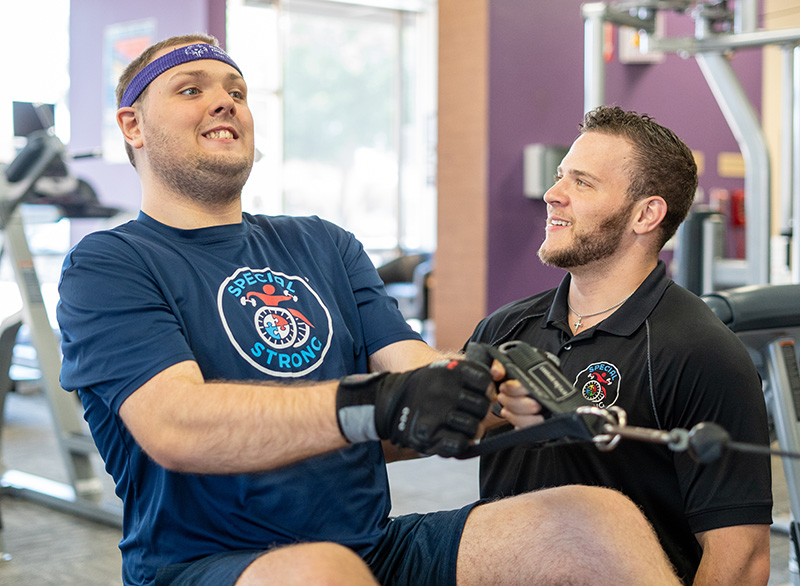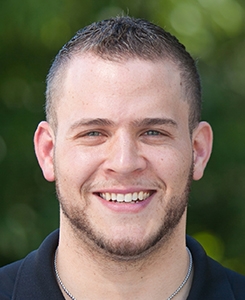It’s hard enough to find support and respite when you have a child with autism, but add a pandemic to the mix, and you’ve really got your hands full. While it’s easy to give in to your child’s requests for sugar and stimulating games (they’re adorable and you want them to be happy, after all!) it’s best to commit the little free time you have to learning things you can do at home like engaging in physical fitness activities and learning about proper nutritional support for autism families just like yours.

Daniel Stein, founder of Special Strong, performing a low row with scapula retraction
to improve the posture of his special needs client, Robert.
In case it wasn’t clear, this is not a post about becoming a licensed behavioral therapist. This is about learning the basics; tactics that you can employ yourself to keep your child with autism happier, more engaged, and worry-free. We’ll cover everything from exercises you can do with your child to changes you can make in your child’s diet to promote a healthier body and mind.
Fewer Meltdowns
You know that your child isn’t a bad kid. More often than not, they’re just confused and want something that they don’t know how to communicate. Using these simple tips can keep your child with autism calm, even in stressful situations, which can result in fewer emotional breakdowns and outbursts.
Better Spacial Awareness
Your child has what’s called a cognitive disability, and if that’s their only diagnosis, then more than likely they don’t have a physical disability to accompany their autism. However, that doesn’t mean that your child can navigate the world without any physical issues. Children with autism often also experience equilibrium issues, which can make them lose their balance more often than other children. The physical exercises below will help your child feel more grounded in space, bringing awareness to each of their body parts to empower them to move more independently.
Brain Changes
Exercise can change the chemical makeup of your brain, and eating different foods can have physical and mental impacts on your body. Everyone can benefit from a consistent workout regimen, abandoning their sedentary lifestyle, and eating a more nutrient-rich diet, but children with autism have even more to gain. When your child is refreshed through exercise and replenished by a new diet, they’ll be able to learn more quickly, improve their memory, reduce their anxiety, and more.
Physical Fitness Activities for Autism Families

Daniel Stein
Founder and Owner
Fun Fitness
“Getting back into shape” is the most common New Year’s resolution for good reason: Working out is a hard habit to learn. Doing crunches isn’t particularly thrilling, and the workout itself really hurts, often leaving you sore for days if you push yourself too hard. It’s already hard to do it yourself, so how are you supposed to entice your child with autism to drop the game console and hop to it?
Believe it or not, working out can be fun. The goal here is to get your kiddo’s heart racing, not to give him or her Kardashian features. It doesn’t have to be that serious. Here are a few fun things you can try with your kid to entice them into getting exercise:
- Play tag
- Go swimming
- See who can jump the highest
- Play hopscotch
- Compromise and play Wii Sports
Sensory Workouts
Another great way to keep your child with autism engaged and active is by encouraging more sensory workouts. Feeling the burn and elevating your heart rate can be enough of an experience for those who don’t have sensory issues, but your kid’s going to need a little more incentive.
Try these activities on for size:
- Go hiking (visual and auditory)
- Swimming (tactile)
- Swinging (tactile and visual)
- Playing catch (tactile and visual)
- Walking with noise-canceling headphones (visual and auditory)
Workout Equipment for Children with Autism
Sometimes fun can be included in an otherwise typical workout by adding special equipment. Children with autism can enjoy dumbbells that light up, cushy exercise mats, indoor vestibular swings, and more.
Nutritional Support for Autism Families
Healthy, Sensory Foods
The number-one obstacle in getting your child with autism to eat healthily is finding foods that don’t disturb their palettes. The trouble is rarely the taste – you can disguise a lot with ketchup these days. Your child might hate eating crunchy foods because the sound of the crunch is too loud in their ears. This can make eating apples, carrots, Asian pears, bell peppers, and other fruits and veggies difficult.
The simplest approach is to replace your kid’s diet with softer foods like cherries (without the pits), bananas, nectarines, cooked broccoli, and mashed potatoes. However, you can also try pureeing the crunchier foods to ensure your child is eating a well-rounded diet, full of fiber, vitamins, and other important nutrients.
Vitamins and Nutrients for Children with Autism
If you’re cognizant of the foods your child is eating, then you’ll start to see changes in their behavior as well as in their overall health. It’s not just about adding more fruits and veggies to their diet (although that’s, of course, a big part of it). It’s about ensuring that they’re eating the foods with the nutrients that will best help them.
Here’s a list of foods to add to your child’s diet that can improve their digestion, focus, temperament, ability to fall asleep, and more:
- Omega 3
- Melatonin
- Protein
- Vitamin B
- Gingko
- Ginseng
Daniel Stein is Founder and Owner of Special Strong + Strong Education. Special Strong provides adapted fitness for special needs children, adolescents, and adults with autism, Down Syndrome, and other disabilities. Through our online training platform, we also provide special needs certification courses for educators, professionals, and parents who want to learn how to adapt fitness to serve the special needs population. Fitness franchise opportunities are available.




[…] Original Article […]